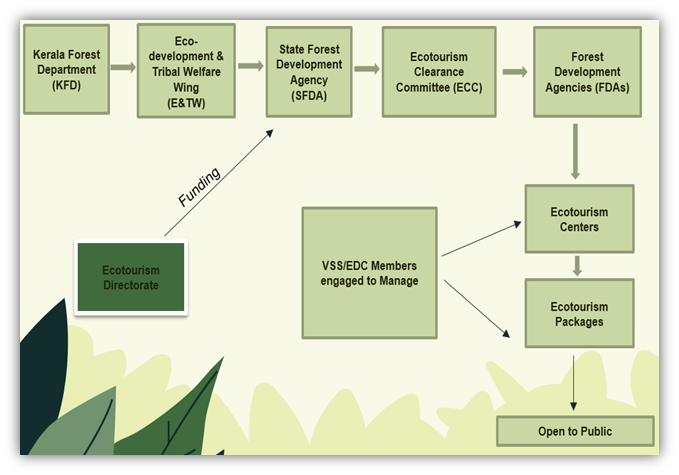The Kerala Forest Department has been providing ecotourism services for the past twenty-five years. Presently, there are 60 ecotourism centers across Kerala managed by the Forest Department. Eco-tourism center offers various packages like trekking, accommodation, sightseeing, boating, cycling and others.
Management of Ecotourism Centers
The Ecotourism Centers are managed by Forest Development Agencies (FDAs) with the support of PFM institutions (Vana Samrkshana Samithis –VSS /Eco-development Committees - EDC) with the State Forest Development Agency (SFDA) as its apex body within the Eco-development & Tribal Welfare Department of the Kerala Forest Department.
The Government vide GO(Rt) No 429/2001/Forest dated 15-10-2001 issued detailed guidelines for maintaining such sites by the VSS/EDCs by levying user charges from the visitors on the principle of “polluter pays”. Members of VSS/EDC are engaged in each ecotourism center. Through this, the forest department provides adequate employment to forest-dependent communities, especially the tribal communities.
The details of the ecotourism centers managed by the Forest Department are mentioned in the Working Plan/Management Plan of the respective Forest Divisions. Also, the details are included in the microplan of VSS/EDC. All Forest Divisions (FDA) also prepare the Ecotourism Annual Plan of Operation (APO) and budget based on the operational plans of VSS/EDCs and submit it to the Executive Committee of the FDA for approval. The approved action plan and budget are submitted to the Member Secretary of SFDA. Various ecotourism activities are implemented based on the approved APO.
Operational Structure of Kerala Forest Ecotourism

The State Forest Development Agency (SFDA)
Founded in 2010, the State Forest Development Agency is the apex body of thirty-six Forest Development Agencies (FDAs) in the State. It is the tertiary unit that oversees the execution of participatory forest management (PFM) programs.
The Major Aims and Objectives of SFDA are as follows:
- To promote and institutionalize Participatory Forest Management for sustainable forest management, conservation of biodiversity and improvement of livelihood of forest-dependent communities along with matters ancillary to them in an environmentally and culturally sustainable way.
- To facilitate, coordinate and monitor the forestry and allied projects of the Central and State Governments, financial institutions recognized by the Central and State Governments and bilateral and multilateral funding agencies through Forest Development Agencies in the State under Participatory Forest Management.
- To embed the central sector afforestation schemes in the overall forestry development programmes of the State aiming at the achievement of the goal of increasing and improving the forest and tree cover, improving productivity of forests and restoring ecologically fragile areas.
The Primary Objectives of SFDA are as follows:
- To undertake such activities in addition to forestry and allied activities, by liaising with other government departments and other agencies to develop and implement eco-friendly village development programmes for forest-dependent communities.
- To enhance the livelihood options of forest-dependent communities by linking forest management to value addition and marketing of forest products through micro and small enterprises and ecotourism activities promoted by Vana Samrakshana Samithis and EcoDevelopment Committees affiliated to Forest Development Agencies and to create necessary institutions for this purpose.
- To arrest and reverse the trend of forest degradation by the forest dependent communities and others by creating a framework of responsibility among them including mechanism for monitoring the removal of such produce from the forest.
- To provide sustainable employment opportunities to the tribals and other weaker sections of the rural population in and around forest areas.
- To create for the forest dependent communities durable community assets which would contribute to overall village development ensuring sustainable utilization of natural resources.
- To act as an independent agency to receive funds from the Central or State Government or any other responsible funding agency and to release the same to the Forest Development Agencies according to the guidelines issued by the funding agencies.
- To approve annual work plans and to provide effective monitoring, evaluation and supervision of the schemes implemented by the Forest Development Agencies.
- To receive, hold and possess any property including securities of any kind and to construct and maintain own building.
- To frame rules and regulations to regulate the activities of the Society.
- To carry out programmes aimed at capacity building of forest dependent communities and other stakeholders for carrying out the objects of the Society.
- To organize and conduct meetings, workshops, seminars, training programmes, awareness campaigns etc. for the benefit of the members and the general public.
- To publish periodicals which may be useful for the welfare of the members or the general public.
- To render consultancy services, training, research and development and other activities for the benefit of its members through identified institutions or individuals.
- To provide assistance to indigenous communities in matters related to Intellectual Property Rights.
- To do all other lawful things as may be incidental or conducive to the attainment of the above objects.
